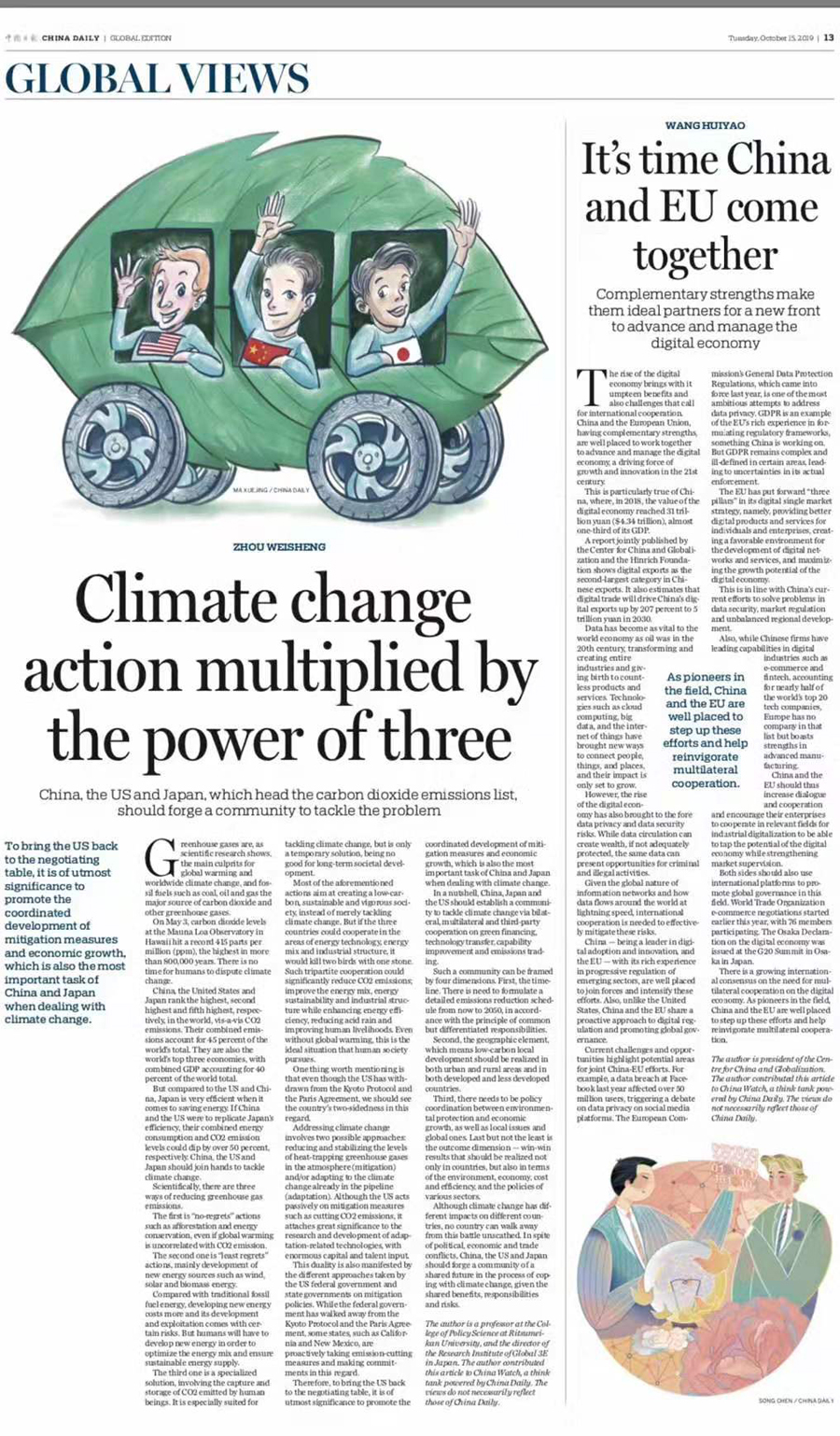Wang Huiyao: It’s time China and EU come together
October 15 , 2019
Complementary strengths make them ideal partners for a new front to advance and manage the digital economy
By Wang Huiyao |
President of the Center for China and Globalization(CCG)
The rise of the digital economy brings with it umpteen benefits and also challenges that call for international cooperation. China and the European Union, having complementary strengths, are well placed to work together to advance and manage the digital economy, a driving force of growth and innovation in the 21st century.
This is particularly true of China, where, in 2018, the value of the digital economy reached 31 trillion yuan ($4.34 trillion), almost one-third of its GDP.
A report jointly published by the Center for China and Globalization and the Hinrich Foundation shows digital exports as the second-largest category in Chinese exports. It also estimates that digital trade will drive China’s digital exports up by 207 percent to 5 trillion yuan in 2030.
Data has become as vital to the world economy as oil was in the 20th century, transforming and creating entire industries and giving birth to countless products and services. Technologies such as cloud computing, big data, and the internet of things have brought new ways to connect people, things, and places, and their impact is only set to grow.
However, the rise of the digital economy has also brought to the fore data privacy and data security risks. While data circulation can create wealth, if not adequately protected, the same data can present opportunities for criminal and illegal activities.
Given the global nature of information networks and how data flows around the world at lightning speed, international cooperation is needed to effectively mitigate these risks.
China – being a leader in digital adoption and innovation, and the EU – with its rich experience in progressive regulation of emerging sectors, are well placed to join forces and intensify these efforts. Also, unlike the United States, China and the EU share a proactive approach to digital regulation and promoting global governance.
Current challenges and opportunities highlight potential areas for joint China-EU efforts. For example, a data breach at Facebook last year affected over 50 million users, triggering a debate on data privacy on social media platforms. The European Commission’s General Data Protection Regulations, which came into force last year, is one of the most ambitious attempts to address data privacy. GDPR is an example of the EU’s rich experience in formulating regulatory frameworks, something China is working on. But GDPR remains complex and ill-defined in certain areas, leading to uncertainties in its actual enforcement.
The EU has put forward “three pillars” in its digital single market strategy, namely, providing better digital products and services for individuals and enterprises, creating a favorable environment for the development of digital networks and services, and maximizing the growth potential of the digital economy.
This is in line with China’s current efforts to solve problems in data security, market regulation and unbalanced regional development.
Also, while Chinese firms have leading capabilities in digital industries such as e-commerce and fintech, accounting for nearly half of the world’s top 20 tech companies, Europe has no company in that list but boasts strengths in advanced manufacturing.
China and the EU should thus increase dialogue and cooperation and encourage their enterprises to cooperate in relevant fields for industrial digitalization to be able to tap the potential of the digital economy while strengthening market supervision.
Both sides should also use international platforms to promote global governance in this field. World Trade Organization e-commerce negotiations started earlier this year, with 76 members participating. The Osaka Declaration on the digital economy was issued at the G20 Summit in Osaka in Japan.
There is a growing international consensus on the need for multilateral cooperation on the digital economy. As pioneers in the field, China and the EU are well placed to step up these efforts and help reinvigorate multilateral cooperation.
About Author

Dr. Wang Huiyao, founder and president of the Center for China and Globalization(CCG), an independent think tank based in Beijing.
Topical News See more






